|
|
|
Sort Order |
|
|
|
Items / Page
|
|
|
|
|
|
|
| Srl | Item |
| 1 |
ID:
103496
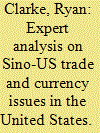

|
|
|
|
|
| Publication |
2011.
|
| Summary/Abstract |
This article provides an in-depth analysis of the dynamics of American expert opinion on Sino-US trade and currency issues, and assesses the impact that these views have on the behaviour of American politicians. Views of leading American economists from industry, universities, think tanks, as well the media are closely analysed against the backdrop of an increasingly complicated and multifaceted discussion in the political realm. This study concludes that the American economic community is itself divided on these critical issues with no particular school of thought gaining ascendency over another, thus providing space for non-expert views and biases. This gap can be exploited for short-term gain with minimal risk to the credibility of American politicians and it should not be entirely surprising that this is happening with increasing frequency.
|
|
|
|
|
|
|
|
|
|
|
|
|
|
|
|
| 2 |
ID:
127772
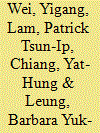

|
|
|
|
|
| Publication |
2014.
|
| Summary/Abstract |
To curb price speculations and overheated investment in the real estate market, the mainland Chinese government has determined to tighten bank lending to the market in recent years, by resorting to administrative tools through specific real estate control policy. With hindsight, the market response seems to have invalidated the policy initiatives. This research is aimed at investigating the impediments to achieving the laudable policy objectives of using administrative credit controls. A series of research interviews with property practitioners unraveled prevalent evasive practices and illicit tactics adopted by developers to thwart policy effects. This study leads to a better understanding of the institutional backdrop behind the less-than-expected results of the real estate macro-control measures. To better steer the real estate market, effective monetary control requires both the government and industry to make concerted efforts and consistent headway towards a complete, transparent and responsive ensemble of institutional arrangements.
|
|
|
|
|
|
|
|
|
|
|
|
|
|
|
|
| 3 |
ID:
124891
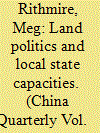

|
|
|
|
|
| Publication |
2013.
|
| Summary/Abstract |
Despite common national institutions and incentives to remake urban landscapes to anchor growth, generate land-lease revenues and display a capacious administration, Chinese urban governments exhibit varying levels of control over land. This article uses a paired comparison of Dalian and Harbin in China's north-east to link differences in local political economies to land politics. Dalian, benefiting from early access to foreign capital, consolidated its control over urban territory through the designation of a development zone, which realigned local economic interests and introduced dual pressures for enterprises to restructure and relocate. Harbin, facing capital shortages, distributed urban territory to assuage the losers of reform and promote economic growth. The findings suggest that 1) growth strategies, and the territorial politics they produce, are products of the post-Mao urban hierarchy rather than of socialist legacies, and 2), perhaps surprisingly, local governments exercise the greatest control over urban land in cities that adopted market reforms earliest.
|
|
|
|
|
|
|
|
|
|
|
|
|
|
|
|
| 4 |
ID:
103502
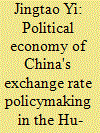

|
|
|
|
|
| Publication |
2011.
|
| Summary/Abstract |
Exchange rate policymaking is of high importance as any adjustment in the exchange rate could influence several sectors of the domestic economy in different ways. It can also have implications for trade and capital flows in the rest of the world. The exchange rate reform objective of the People's Bank of China is to ultimately achieve a freely floating exchange rate regime through a sequential approach to achieving more flexibility of RMB movement in response to market demand-supply relations.
|
|
|
|
|
|
|
|
|
|
|
|
|
|
|
|
| 5 |
ID:
124558
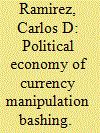

|
|
|
|
|
| Publication |
2013.
|
| Summary/Abstract |
In recent years, one of the most frequently debated issues in Congress has been the value of the Chinese renminbi (RMB) relative to the U.S. dollar. Many members of Congress often accuse China of being a "currency manipulator." This paper has two objectives. First, it investigates the extent to which PAC contributions from key interest groups as well as constituent interests influence the frequency with which members of Congress criticize China's exchange rate policy, controlling for other factors. The results indicate that the odds that a congressman will call China a "currency manipulator" are 1.35 times higher for every $5000 in PAC contributions from groups that favor legislation against China. In addition, the results show that a one percentage point increase in the share of the congressional district labor force in manufacturing is associated with a 19.6% increase in the likelihood that the district's legislator will label China a "currency manipulator." Second, this paper investigates the consequences that "currency manipulation" bashing may have on the rate at which the RMB appreciates against the U.S. dollar. The results for a VAR model indicate that an increase in the incidence of "currency manipulation" bashing appears to temporarily slow down, rather than accelerate, the rate at which the renminbi appreciates against the dollar. This result suggests that bashing China may actually be counterproductive.
|
|
|
|
|
|
|
|
|
|
|
|
|
|
|
|
| 6 |
ID:
124563
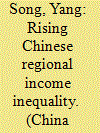

|
|
|
|
|
| Publication |
2013.
|
| Summary/Abstract |
This article examines the quantitative effects of the Chinese fiscal system on the increasing regional income inequality in China, from 1978 to 2007. Fiscal decentralization is a multifaceted concept not likely to be captured by a single measure. This paper investigates the evolution of three aspects of fiscal decentralization including spending decentralization, revenue decentralization, and autonomy power, and tests the effects of each aspect on the regional income inequality in China in the past thirty years. Several critical findings were obtained through econometric analysis. The fiscal decentralization on spending side in China has contributed to rising income inequality over the last three decades. On the revenue side, the fiscal system became more decentralized from mid-1980s to 1994, and re-centralized after the 1994 tax sharing reform. The econometric analysis shows that the increase in revenue share of local governments from mid-1980s to 1994 indeed increased regional inequality, while the revenue re-centralization in 1994 only had a modest effect on reducing regional inequality. In terms of autonomy power measured by how public spending at local level of government is maintained by its own revenue, the degree of fiscal decentralization decreased since mid-1980s, and experienced a sharp reduction in 1994 due to the tax sharing reform. The autonomy power has mixed effects on regional inequality in the two periods, before and after the 1994 reform, depending on the targeting of fiscal transfers and the incentives of local governments. As it turns out, fiscal decentralization may not be automatically equalizing or anti-equalizing, whereas how fiscal decentralization is promoted is important for how it impacts regional inequality.
|
|
|
|
|
|
|
|
|
|
|
|
|
|
|
|
| 7 |
ID:
133951
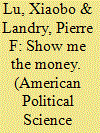

|
|
|
|
|
| Publication |
2014.
|
| Summary/Abstract |
We argue that interjurisdiction competition in authoritarian regimes engenders a specific logic for taxation. Promotion-seeking local officials are incentivized to signal loyalty and competence to their principals through tangible fiscal revenues. The greater the number of officials accountable to the same principal, the more intense political competition is, resulting in higher taxation; however, too many officials accountable to the same principal leads to lower taxation due to shirking by uncompetitive officials and the fear of political instability. Using a panel dataset of all Chinese county-level jurisdictions from 1999-2006, we find strong evidence for an inverse U-shaped relationship between the number of county-level jurisdictions within a prefecture-our proxy for the intensity of political competition-and fiscal revenues in most provinces but not so in politically unstable ethnic minority regions. The results are robust to various alternative specifications, including models that account for heterogeneous county characteristics and spatial interdependence.
|
|
|
|
|
|
|
|
|
|
|
|
|
|
|
|
| 8 |
ID:
083945
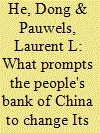

|
|
|
|
|
| Publication |
2008.
|
| Summary/Abstract |
In the present paper, we model the policy stance of the People's Bank of China (PBC) as a latent variable, and the discrete changes in the reserve requirement ratio, policy interest rates, and the scale of open market operations are taken as signals of movement of this latent variable. We run a discrete choice regression that relates these observed indicators of policy stance to major trends of macroeconomic and financial developments, which are represented by common factors extracted from a large number of variables. The predicted value of the estimated model can then be interpreted as the implicit policy stance of the PBC. In a second step, we estimate how much of the variation in the PBC's implicit stance can be explained by measures of its policy objectives on inflation, growth and financial stability. We find that deviations of CPI inflation from an implicit target and deviations of broad money growth from the announced targets, but not output gaps, figure significantly in the PBC's policy changes.
|
|
|
|
|
|
|
|
|
|
|
|
|
|
|
|
|
|
|
|
|